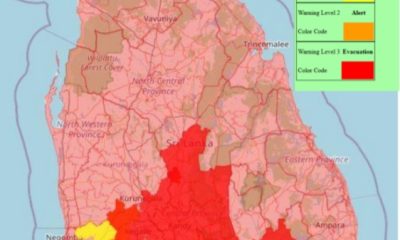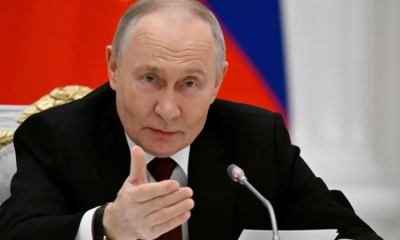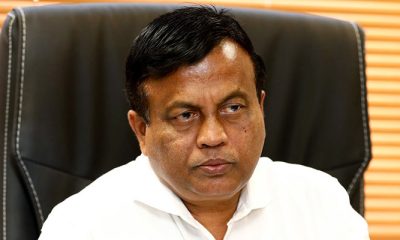News
Corruption fighter raises concerns over unwarranted redacting in asset declaration

ECONOMYNEXT Transparency International Sri Lanka (TISL), the local body of Transparency International (TI), which has been fighting against corruption in Sri Lanka has raised concerns over unwarranted redacting of information in asset declaration mandated by a new Anti-Corruption Act.
The island nation’s anti-graft body the Commission to Investigate Allegations of Bribery or Corruption (CIABOC) has received asset declarations of over 100 persons who are obligated to submit their asset and liabilities declarations.
This includes top officials and the President. The CIABOC has made details of all the assets and liabilities of public officials it has received in its official website under ‘Declaration of Assets’ sub category.
The CIABOC is in the process of establishing a centralized electronic system in compliance with the law.
“While this step towards public transparency is a welcome move, concerns have emerged regarding the extent of information being made available,” the TISL said in a statement.
“TISL expresses deep concern over a significant amount of crucial information that has been arbitrarily and unnecessarily redacted. Information such as bank balances and the dates on which accounts were opened are not revealed, raising serious concerns as to the transparency and effectiveness of these declarations.”
The recent data showed that at least 90 out of the total 225 Sri Lankan legislators are yet to provide their assets and liability details to the CIABOC in line with the new law.
The new Anti-Corruption Act comes after President Ranil Wickremesinghe’s administration promised the International Monetary Fund (IMF) to bring in strong laws to combat corruption under a $3 billion bailout package.
Though Sri Lanka has several laws to prevent corruption, no government has implemented the rule of law in a fair manner, analysts say.
Most governments in the past have used the anti-corruption laws for political agenda and silenced some anti-government critics within and outside opposition parties.
Anti-graft experts say corruption is now deep rooted in both government and private sector firms with many Sri Lankans considering them as a norm. As a results, past and current laws have failed to be effective enough to stop corruptions.
No political leader in Sri Lanka has been able to curb corruption despite promises during elections.
The TISL said the Anti-Corruption Act allows only specific information in the asset declarations to be redacted. This includes bank account numbers and details of any other deposits.
“It appears the authority has taken a very broad approach of interpretation to redact crucial information such as bank balances and dates, in complete disregard of the spirit and intention of the law, thereby defeating the purpose of making asset declarations publicly available,” the TISL said.
It said the CIABOC “appears to” have misinterpreted a clause of the new Act which is relevant to ‘any other’ deposit types that are not bank accounts.
“Such arbitrary misinterpretation of the Act undermines the purpose of the asset declaration system and public access to the same, rendering its implementation ineffective.”
“This potential creation of a loophole to skirt the law by public officials and responsible institutions is deeply concerning, and breeds mistrust in the CIABOC’s commitment to effective implementation of the anti-corruption law.”
The corruption has already deterred foreign investment into Sri Lanka, as businesses often face bureaucratic hurdles and demand for bribes, good governance analysts say.
It has also hit development projects, leading to cost overruns and delays, which has led to loss of public trust.
Though Sri Lanka has had several laws aimed at combating corruption, including the Bribery Act and the Declaration of Assets and Liabilities Laws, the enforcement has been inconsistent.
Majority of Sri Lankans blame corruption at ministry and bureaucratic level for an unprecedented economic crisis that led Sri Lanka to declare bankruptcy with sovereign debt default in 2022.
Since then, there has been a strong public demand to eliminate corruption with calls for accountability and reforms amid international pressure.
The TISL has also raised concerns over demanding a mandatory email address for those who want to see the assets and liability details in the website.
“TISL is concerned that this unnecessary and unmandated requirement creates an additional barrier, restricting access to asset declarations to a large number of the public across the island,” it said.
“Making asset declarations public is a recommendation by the International Monetary Fund that is now an element in the Government Action Plan for implementation. One of the objectives is to enable the public to monitor potential unjust enrichment by public officials, which is undermined by the actions of CIABOC with its unnecessary extent of redaction.”
“For public access to be meaningful in the current reform process, TISL urges the CIABOC to reconsider the extent of the current redactions in the spirit of fully implementing the law, ensuring that crucial and sufficient information is available for citizens in holding public officials accountable.”The TISL urged swift action for effective utilisation of such publicly accessible asset declarations, especially in implementing upcoming laws on Proceeds of Crime and Beneficial Ownership.
Latest News
486 dead, 341 missing, 171,778 displaced as at 0600hrs today [05]

The situation report issued by the Disaster Management Center at 0600hrs today [5th December] confirms that 486 persons have died and another 341 persons are missing after the devastating weather conditions in the past week.
171,778 persons have been displaced and have taken refuge at 1,231 safety centers established by the government.

News
Media slams govt.’s bid to use Emergency to silence critics

Media organisations have denounced Deputy Minister of Public Security and Parliamentary Affairs Sunil Watagala after he urged law enforcement authorities to use emergency regulations to take action against those posting allegedly defamatory content about the President and senior ministers on social media.
The Sri Lanka Working Journalists Association (SLWJA) yesterday issued a strongly worded statement condemning Watagala’s remarks, warning that they posed a direct threat to freedom of expression and media rights, particularly at a time when the country is struggling through a national disaster.
Watagala made the controversial comments on 2 December during a meeting at the Malabe Divisional Secretariat attended by government officials and Deputy Media Minister Dr. Kaushalya Ariyarathna. During the discussion, the Deputy Minister claimed that a coordinated effort was underway to spread distorted or false information about the disaster situation through physical means, social media, and even AI-generated content. He also alleged that individuals based overseas were contributing to such activity.
According to the SLWJA, Watagala went further, directing police officers present at the meeting to treat those posting such content “not merely as suspects but as offenders” and to take action against them under emergency regulations currently in force.
The SLWJA accused the government of abandoning the democratic principles it once campaigned on, noting that individuals who publicly championed free speech in the past were now attempting to clamp down on it. The association said this was not an isolated incident but part of a pattern of growing state pressure on journalists and media platforms over the past year.
It warned that attempts to criminalise commentary through emergency powers especially during a disaster constituted a grave violation of constitutional rights. The union urged the government to respect democratic freedoms and refrain from using disaster-related powers to silence criticism.
In a separate statement, Internet Media Action (IMA) also expressed “strong objection” to Watagala’s comments, describing them as a “serious threat to freedom of expression”, which it said is a fundamental right guaranteed to all Sri Lankan citizens.
The IMA said Watagala’s assertion that “malicious character assassination attacks” were being carried out against the President and others through social media or other media channels, and that such acts should attract severe punishment under emergency law, represented “an abuse of power”. The organisation also criticised the Deputy Minister’s claim that false opinions or misrepresentations whether physical, online, or generated by AI could not be permitted.
Using emergency regulations imposed for disaster management to suppress political criticism amounted to “theft of fundamental rights”, the statement said, adding that the move was aimed at deliberately restricting dissent and instilling fear among social media users.
“Criticism is not a crime,” the IMA said, warning that such rhetoric could lead to widespread intimidation and self-censorship among digital activists and ordinary citizens.
The group demanded that Watagala withdraw his statement unconditionally and insisted that freedom of expression cannot be curtailed under emergency laws or any other legal framework. It also called on the government to clarify its stance on the protection of fundamental rights amid increasing concerns from civil society.
News
Cardinal calls for compassionate Christmas amid crisis

Archbishop of Colombo, Cardinal Malcolm Ranjith, has called on Sri Lankans to observe this Christmas with compassion and restraint, as the nation continues to recover from one of its worst natural disasters in recent memory.
In his message, the Colombo Archbishop has highlighted the scale of the crisis, noting that more than 1.5 million people have been displaced, while an “uncounted number” remain buried under debris in the hill country following landslides and severe flooding.
“It is a most painful situation,”
he has written acknowledging the difficulty of celebrating a season traditionally associated with joy while thousands are mourning lost loved ones, living in refugee centres, or left with nothing but the clothes they were wearing.
The Cardinal has urged the faithful to temper excessive celebrations and extravagance, instead focusing on helping those affected. “Celebrate, by all means, yes, but make it a moment of spiritual happiness and concern for the needs of those who suffer,” he said. “Assist as much as possible those who lost their loved ones, their homes, and their belongings.”
He has called for a Christmas marked by love, sharing, and solidarity, describing it as an opportunity to make the season “a deeply spiritual and joyful experience.”
-

 News5 days ago
News5 days agoWeather disasters: Sri Lanka flooded by policy blunders, weak enforcement and environmental crime – Climate Expert
-

 Latest News6 days ago
Latest News6 days agoLevel I landslide RED warnings issued to the districts of Badulla, Colombo, Gampaha, Kalutara, Kandy, Kegalle, Kurnegala, Natale, Monaragala, Nuwara Eliya and Ratnapura
-

 Latest News6 days ago
Latest News6 days agoINS VIKRANT deploys helicopters for disaster relief operations
-
News2 days ago
Lunuwila tragedy not caused by those videoing Bell 212: SLAF
-

 Latest News6 days ago
Latest News6 days agoDepartment of Irrigation issues Critical flood warning to the Kelani river basin
-

 Latest News4 days ago
Latest News4 days agoLevel III landslide early warnings issued to the districts of Badulla, Kandy, Kegalle, Kurunegala, Matale and Nuwara-Eliya
-

 News6 days ago
News6 days agoCountry reels under worst weather in living memory
-

 Editorial6 days ago
Editorial6 days agoNeeded: Action not rhetoric



















